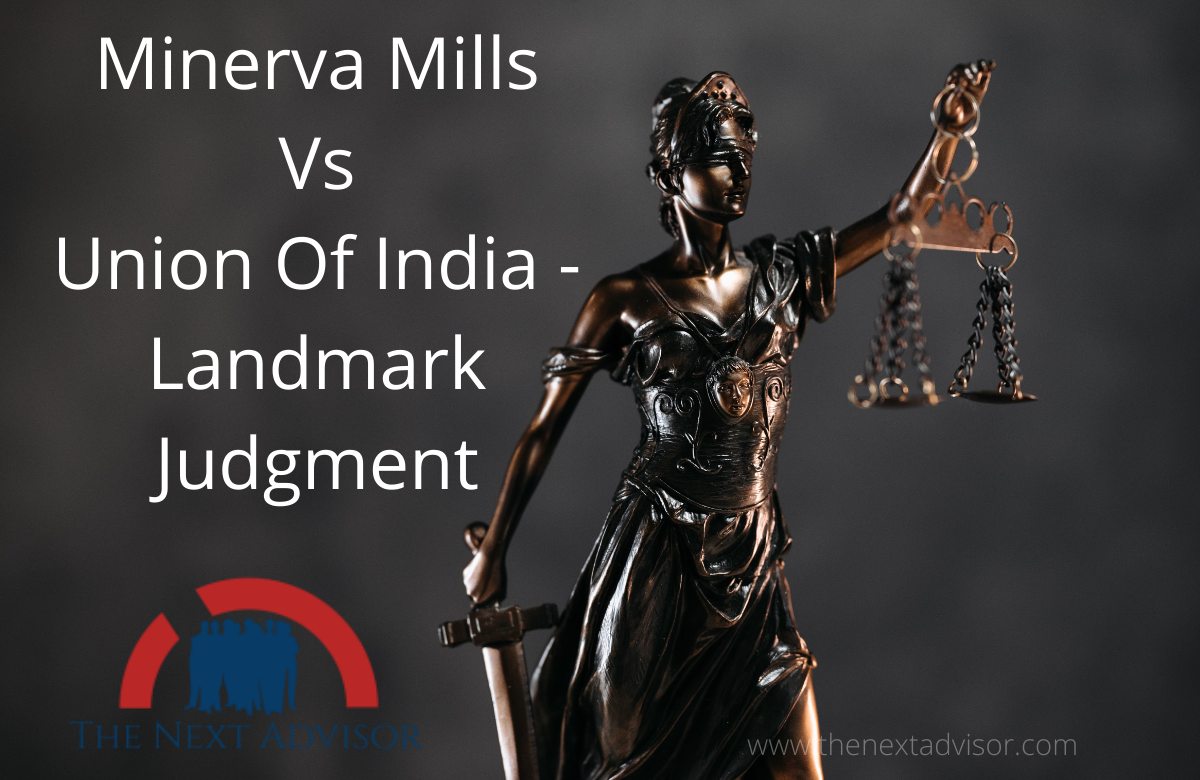Minerva Mills Vs Union Of India – is the landmark judgment delivered by the Honourable Supreme Court of India.
BASIC CONCEPTS WHAT ARE DIRECTIVE PRINCIPLES OF STATE POLICY?
• Directive Principles of State Policy are ideals that are meant to be kept in mind by State while formulating policies and enacting laws.
• Principles that aim at providing social and economic justice and set the path toward a welfare State, in short, establishing social and economic democracy.
• Article 39b deals with the ‘ ownership & control of material resources of the community are distributed in the common good. Article 39c deals with the ‘ operation of economic system do not result in the concentration of wealth’.
BASIC CONCEPTS
• 25th Constitutional Amendment added Article 31 – C.
● 31 – C was added to ‘ Save the laws that give effect to Directive Principles of State Policy ‘ . ‘ Equality before law and Article 14 under Right to Equality equal protection of laws ‘.
● Article 19 under the Right to Freedom – ‘ Protection of six rights regarding freedom of :
i ) speech and expression ;
ii ) assembly ;
iii ) association ;
iv ) movement ;
v ) residence ;
vi ) profession ‘.
WHAT HAPPENED IN THE KESHAVANANDA BHARTI CASE?
Upheld the validity of the 24th and 25th constitutional amendment act with the condition that it cannot be outside the judicial review. • 25th amendment added 31C to save laws giving effect to 39b and 39c of DPSP. • Evolved basic structure doctrine.
HOW DID THIS CASE EVOLVE?
• As a reaction to provisions of the 42nd amendment act which extended the scope of 31C, which now includes that all the provisions of Directive Principles of State Policy can be given effect by violating the Fundamental Right 14,19,31.
• 42nd amendment act gave legal supremacy to Directive Principles of State Policy over Fundamental Rights 14, 19, 31 It also declared that there is no limitation to amending power of the parliament and no amendment can be questioned in any court of law on any grounds.
Minerva Mills Case (1980) (Minerva Mills Vs Union Of India) Background :
• Minerva Mills was a textile mill located near Bangalore city.
• Congress government had nationalized it in the early 1970s claiming that it was mismanaged.
• 1977, the erstwhile owners approached the Supreme Court to challenge its nationalization.
•Nani Palkivala fought the case from the petitioner’s side viz. owner’s side. The case involved the government’s nationalization powers and the right to property.
Minerva Mills Case ( 1980 ) (Minerva Mills Vs Union Of India) – However, the fundamental right to property under the Constitution had just been deleted.
• So Palkivala challenged the provisions of the 42nd amendment which extended the scope of 31 ( C ), the provision which now includes all provisions of Directive Principles of State Policy can violate Fundamental Rights 14, 19, 31. In short, give Parliament unfettered powers to amend the Constitution and also take away the jurisdiction of the courts to review such amendments.
Question of law involved before the court in Minerva Mills Vs Union Of India/Minerva Mills Case ( 1980 )-
1. Whether law abridging Fundamental Rights can be constitutional if it is to fulfill the Directive Principles of State Policy .
2. Can Parliament exercise its limited power to grant itself unlimited power.
Minerva Mills Case ( 1980 ) (Minerva Mills Vs Union Of India)- Judgement :
• Indian Constitution is founded on the bedrock of balance b / w Fundamental Rights & Directive Principles of State Policy. Together they are the core of the commitment to social revolution.
• They are two wheels of the same chariot & giving one supremacy over the other will harm the doctrine of a harmonious constitution. Harmony b / w the two is the basic structure. Goals of Directive Principles of State Policy have to be achieved without abrogating Fundamental Rights.
BASIC STRUCTURE OF CONSTITUTION
• Present Position: Fundamental Rights have Supremacy over Directive Principles of State Policy to be implemented without hampering basic structure.
• If 39 ( b ) ( c ) is to be given effect then 14 & 19 can be abrogated.



























